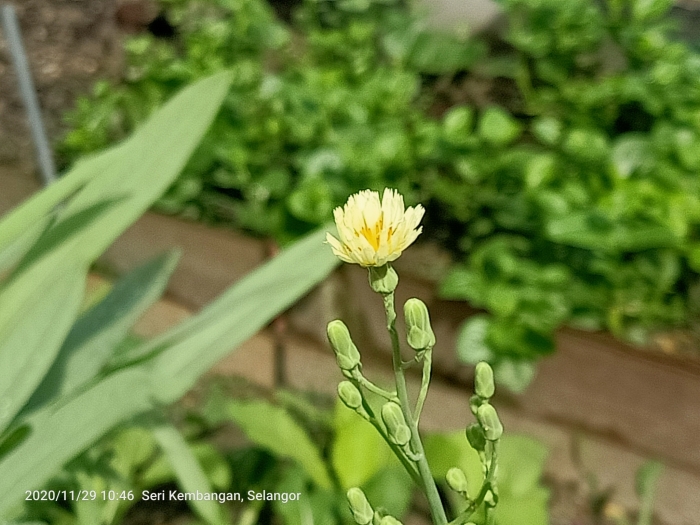Prickly Lettuce
(Lactuca serriola)
Prickly Lettuce (Lactuca serriola)
/
/

© Ong Jyh Seng
CC BY-SA 4.0
Image By:
© Ong Jyh Seng
Recorded By:
Copyright:
CC BY-SA 4.0
Copyright Notice:
Photo by: © Ong Jyh Seng | License Type: CC BY-SA 4.0 | License URL: http://creativecommons.org/licenses/by-sa/4.0/ | Uploader: ongzi | Publisher: iNaturalist |























Estimated Native Range
Summary
Lactuca serriola, commonly known as prickly lettuce, is an annual or biennial herb native to a wide range of habitats including open woodlands, disturbed areas, roadsides, and waste places in Europe, Asia, and North Africa. It typically grows up to 7 feet tall with a reddish stem that can be branched or unbranched. The leaves are oblong, spiny, and have a waxy coating, with the undersides containing milky latex. Prickly lettuce blooms in the summer, producing small yellow flowers that are not particularly showy. After flowering, it forms dandelion-like seed heads.
Prickly lettuce is known for its edibility and medicinal properties. Young leaves can be used in salads, while older leaves may be steamed or cooked. It has been used historically in Greek medicine and rituals. The plant’s lactucarium has sedative and analgesic properties. In cultivation, it requires minimal care, thriving in full sun to part shade and adapting to a variety of soil types, though it prefers well-drained soils. It is drought-tolerant once established. However, gardeners should be cautious as Lactuca serriola can be invasive outside its native range and may outcompete native vegetation. It is also known to host pests such as aphids and to harbor diseases like lettuce downy mildew.CC BY-SA 4.0
Prickly lettuce is known for its edibility and medicinal properties. Young leaves can be used in salads, while older leaves may be steamed or cooked. It has been used historically in Greek medicine and rituals. The plant’s lactucarium has sedative and analgesic properties. In cultivation, it requires minimal care, thriving in full sun to part shade and adapting to a variety of soil types, though it prefers well-drained soils. It is drought-tolerant once established. However, gardeners should be cautious as Lactuca serriola can be invasive outside its native range and may outcompete native vegetation. It is also known to host pests such as aphids and to harbor diseases like lettuce downy mildew.CC BY-SA 4.0
Plant Description
- Plant Type: Herb
- Height: 1.25-2.5 feet
- Width: 0.75-1.75 feet
- Growth Rate: Moderate
- Flower Color: Yellow
- Flowering Season: Summer, Fall
- Leaf Retention: Deciduous
Growth Requirements
- Sun: Full Sun
- Water: Medium
- Drainage: Medium, Fast
Common Uses
Bird Garden, Edible*Disclaimer: Easyscape's listed plant edibility is for informational use. Always verify the safety and proper identification of any plant before consumption., Low Maintenance
Natural Habitat
Native to open woodlands, disturbed areas, roadsides, and waste places
Other Names
Common Names: Prickly Lettuce, Compass Plant, Divlja Salata, Wild Lettuce
Scientific Names: , Lactuca serriola, Hieracium lactuca, Lactuca albicaulis, Lactuca altaica, Lactuca angustana, Lactuca angustifolia, Lactuca angustifolia, Lactuca augustanae, Lactuca auriculata
GBIF Accepted Name: